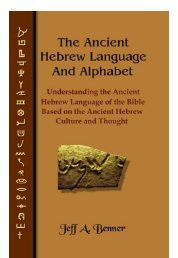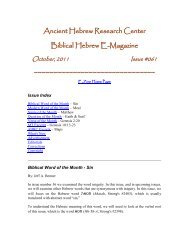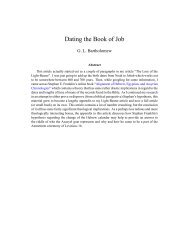My Name Forever - Ancient Hebrew Research Center
My Name Forever - Ancient Hebrew Research Center
My Name Forever - Ancient Hebrew Research Center
You also want an ePaper? Increase the reach of your titles
YUMPU automatically turns print PDFs into web optimized ePapers that Google loves.
<strong>My</strong> <strong>Name</strong> <strong>Forever</strong> 11<br />
oIe n iIpM C o t u oIr S C .g kIPho t u Uehrh . r t vk g o JD oh cgv UtkNho t d:th ,kve<br />
: tU vh o J .g v kIPH J<br />
Ecclesiastes 11:3 If the clouds fill up with rain, they empty upon the earth; and whether<br />
the tree falls to the south or to the north, in the place where the tree falls, there it shall<br />
be.<br />
33. "There it shall be," translates sham y’hú tU vh o J. Sham o J means “there.” The Analytical<br />
<strong>Hebrew</strong> Lexicon, which breaks up each word in the <strong>Hebrew</strong> text into its component parts, gives us some<br />
very interesting information about the word y’hú tU vh. It is a third person singular, masculine, Kal future<br />
(he will...) form of the verb Hei Vav Hei /v/u/v (to be)! ("Tree" is a masculine word in <strong>Hebrew</strong>.) A note in<br />
brackets also informs us that y’hú tU vh is apocopated (abbreviated as “ap.” or “apoc.”). “Apocopated”<br />
simply describes “the loss of one or more sounds or letters at the end of a word...” 31 Here is the entry:<br />
tU vh Kal fut. 3 per. sing. masc. [for Uvh ap. for vuvh § 24. rem. 3] . . . . . . . vuv 32<br />
34. According to the Analytical Lexicon the word y’hú tU vh is a shortened verbal form of Yeheveh<br />
vuvh. It reflects the meaning of the <strong>Name</strong> exactly and is identical in pronunciation with how it is<br />
pronounced at the end of Michaiah's name sometimes. The note in brackets also directs us to section 24<br />
remark 3 at the front of the lexicon where we read that y’hú tU vh is a shortened “Syriac” form of Yih’veh<br />
vu vh.<br />
The verbs vh v to be and vhj to live, which would properly have in the fut. apoc. h vh, and<br />
h jh, change these forms into h vh and h jh... A perfectly Syriac form is tUvh Ec. 11.3, for<br />
vu vh, ap. Uvh (from vu v to be). 33<br />
35. In the first quote from the Analytical Lexicon we are told that y’hú tU vh is a shortened form of<br />
Yeheveh vuvh, while in the second we read that it is a shortened form of Yih’veh vu vh. The discrepancy<br />
arises from the fact that neither of the longer forms is found in any <strong>Hebrew</strong> literature. The longer forms<br />
are hypothetical reconstructions based on what we know of <strong>Hebrew</strong> verb patterns. Since it is the<br />
shortened form which mirrors the pronunciation of the <strong>Name</strong> in Michaiah’s name, it is the shortened<br />
forms of y’hi h vh and y’hu Uvh which next require our attention.<br />
Y’hi h vh and Y’hu Uvh<br />
36. So, we have in the words y’hí h vh (root Hei Yud Hei /v/h/v) and y’hú U vh (root Hei Vav Hei /v/u/v)<br />
shortened forms of the imperfect. Normally this shortened form represents a nuance of meaning called the<br />
“jussive,” 34 which expresses a “command or wish” 35 and is recognized in Lamed-Hei v"k verbs 36 by the<br />
31 Merriam-Webster: New Collegiate Dictionary (G. & C. Merriam Co., 1997), p. 53.<br />
32 Davidson: Lexicon, p. 300.<br />
33 Davidson: Lexicon, p. 51.<br />
34 Gesenius: Grammar, p. 129.<br />
35 Gesenius: Grammar, p. 131.<br />
36 Lamed-Hei v"k verbs have a Hei v as the third letter of the root.






